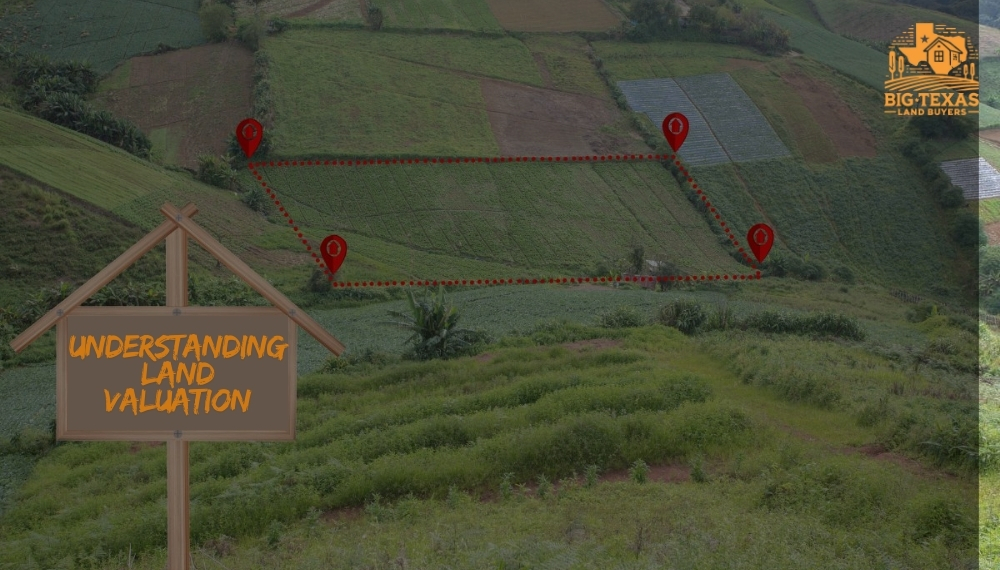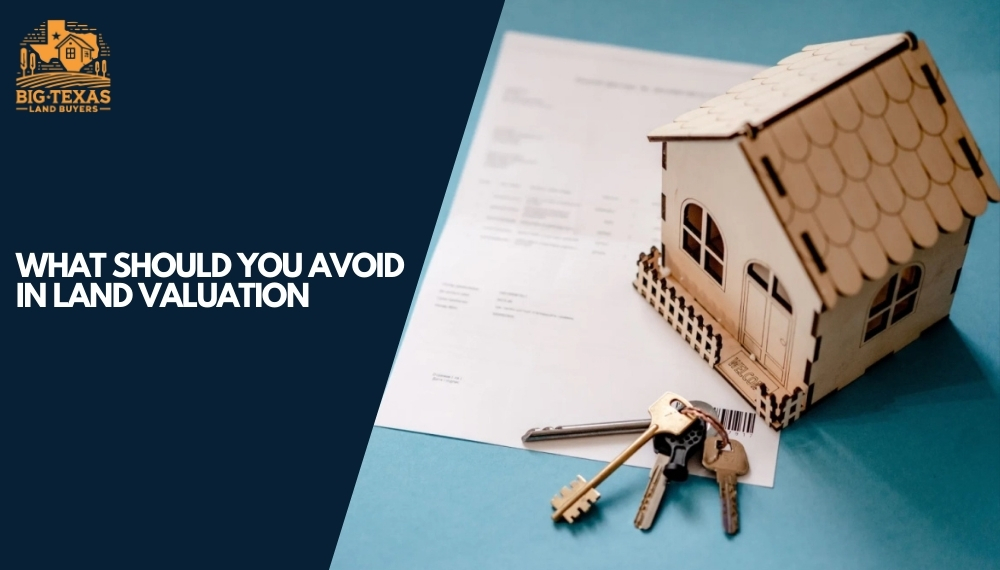Land value is a crucial measurement, ought to be sold, used for development or assessment of your investment. As a landowner, you want to understand land valuation to make informed decisions to get a fair price. This guide to land valuation essentials helps Big Texas Land Buyers break down the basics of what goes into valuing your piece of property in order to make sure you get what your land is equally worth.
Understanding Land Valuation

Land valuation or land valuation is the process of finding how much land is worth. Land valuation is different from residential or commercial property valuation which focuses only on the land itself disregarding the properties in it. Valuation of this is necessary for purposes of selling, financing, taxation and planning for development.
Factors determining land value
Valuation of land is a result of many factors. Knowing what these are can give you a better idea of your property’s value.
1. Location
Undoubtedly, location is the most important determinant of land value. Schools, transportation hubs, urban centers, and amenities can also increase land prices dramatically due in part to proximity and where property is located. Land values will increase in Texas when areas are experiencing economic growth or infrastructural developments.
2. Size and Shape
That’s why the size of your land parcel is everything. Prices, however, tend to be higher for larger plots, although location or usability can be top factors in deciding prices. The shape of the plot is also affected by the shape of the land, regular plots are generally more desirable and valuable than plots with irregular shapes.
3. Topography and Soil Quality
Valuation is heavily influenced by the physical characteristics of the land as its elevation, slope and quality of the soils. More important for industrial, agricultural and development purposes is flat land with rich soil and well drained. On the other hand, hilly or rocky terrains may reduce land value because building a house provokes problems.
4. Zoning and Land Use regulation.
Zoning laws control the uses of land, on a residential, commercial, agricultural or industrial basis. Land of higher value is land that is originally designated for multiple uses or high value development. Local zoning regulations are something you must understand as they can work with and for you, or work against you.
5. Utilities and Infrastructure — Access to infrastructure
Land values are heavily determined by availability of essential utilities (water, electricity, sewage and road access). As such, buyers and developers tend to favour land that is nearby infrastructure, making it more valuable in the land market.
6. Market Conditions
Land valuation is affected by supply and demand dynamics, interest rates and economic factors that are discernable in land trends of the real estate markets. Land values increase in a seller’s market when demand for that land exceeds supply. In the opposite scenario, values might situate or soften.
Methods of Valuing Land
There are a number of different ways to calculate land value, depending upon the circumstance and the purpose for which that value will be used.
1. Comparative Market Analysis (CMA).
CMA stands for comparing your land to others that were recently sold in the area. This is a method to calculate a fair market value based on factors like location, size and amenities. CMA is used by Big Texas Land Buyers to compare current trends in the market and offer buyers competitive bids.
2. Cost Approach
Using the cost approach, land values are based on what it costs to purchase a similar piece of land, corrected for depreciation and other things. A particularly appropriate method of valuation is when comparable sales data is limited or when valuing unique or undeveloped property.
3. Income Approach
The income approach does this by estimating land value based on what it can earn. This is a common method of employing property or land for intended commercial development. It looks at such things as rental income, lease agreements or future development plans.
The Steps to Determine Your Land’s Value
Valuing your land accurately is a systematic approach. Here’s how you can assess your land’s worth:
1. Research Comparable Sales
The first thing you do is to research the recent sales of similar land parcels in the area. See if you can find similar properties with respect to size, location and features. The comparative data for this data provides a bar for estimating the value of your land.
2. Hire the services of a Professional Appraiser.
Getting in with a certified appraiser will give you a precise valuation. Factors they consider in appraising include market conditions, land characteristics and zoning laws.
3. It is time to Consider Development Potential.
Calculate how much more the land could be used in the future. Land that is viewable, suitable for residential, commercial, or agricultural development has higher value. Knowing zoning laws and proximity of local development plans, can make your land an easier sell.
4. Assess Environmental Factors
Factors of which both economic and environmental qualities can affect land value include flood zones, soil contamination, or protected areas. By meeting environmental regulations, you ensure your land won’t be penalised in valuation and make transactions more seamless.
5. Evaluate Accessibility
Make sure there is good access that your land has to roads and to transportation networks. Accessibility that makes land easier to use is attractive to buyers or potential developers and raises land value.
With Big Texas Land Buyers
At Big Texas Land Buyers we specialize in providing fair offers and accurate land valuations for Texas landowners. With our expertise and local market knowledge you can be sure you’re getting the best possible value for your property.
Our Valuation Process
- Initial Consultation: First, we fully evaluate your land for all the factors that will influence its value.
- Market Analysis: We take a detailed look at the market analyzing your land with recent sales and current market trends.
- On-Site Evaluation: We do an on site inspection to determine what physical attributes of the land are, how accessible it is and what potential development opportunities exist.
- Final Valuation: By combining our research and on site findings we give you a detailed valuation report.
- Fair Offer: Using the valuation, we make a competitive and fair offer as it suits your needs.
The Reasons Why You Should Choose Big Texas Land Buyers
- Expertise: We have many years’ experience in the Texas land market and we know the details that impact land value.
- Transparency: We give you clear and honest valuation so you know exactly what you’re getting.
- Efficiency: The way we’ve streamlined the process means that we’re able to provide you with a quick and hassle free valuation and sale experience.
- Customer-Centric: Your needs come first and we personalize the solutions for you, according to what you want to achieve.
What Should You Avoid in Land Valuation?

To value land precisely is critical. Here are common pitfalls to avoid:
Ignoring Market Trends
If you do not account for the current market conditions, you will over or undervalue your land. Do not yoyo around, never stay out of touch with local real estate trends or economic indicators.
Ignoring Zoning Regulations
Land use and value are very much affected by zoning laws. If you ignore these regulations, it can lead to inaccurate valuations and legal ambiguities.
Lack of dealing with Physical Attributes
Every square inch of the land that was productive had its physical characteristics—topography and quality of soil—examined, the pattern of which affects its usability and value. During the valuation it’s important to ensure that these factors are properly evaluated.
This means Relying Almost Entirely on Online Tools and processes.
Online valuation tools are great for getting an idea, or at least giving a ballpark figures, but they’re certainly not as accurate or as comprehensive as a professional appraisal. To get to know what you should pay, you can consult a certified appraiser or any trusted buyers like Big Texas Land Buyers.
Maximizing Your Land’s Value
Increased offers and investment returns can be achieved by improving your land’s value. Here are strategies to maximize your land’s worth:
Improve Accessibility
There are many ways to enhance your land’s value: building or upgrading roads to make it easier to access. This makes your land more attractive to buyers and developers who will pay more because your land is easier to get to.
Clear and Maintain the Land
Clearing debris, controlling vegetation and keeping the land up to standard can make the land more attractive. The more likely your property will be in a good state of repair, the more likely it will attract higher offers.
Obtain Necessary Permits
With a possession of a necessary permit, it can help increase the value of the land. Documentation of the land’s properties reassures the buyers of the usability of their land.
Accreditation Highlights Development Potential
Prepare plans as well as helping you get pre-approvals for zoning changes to help showcase your land’s development potential. Such demonstration of potential uses can increase value by enhancing buyer interest.
Why Professional Valuation Matters?
Although self assessment can give you an idea, professional rating is more precise and predictable. Here’s why professional valuation is essential:
Objective Assessment
Let’s say, professional appraisers provide independent valuation based on complete analysis and they apply their knowledge on market valuation using data.
Comprehensive Analysis
Detailed valuation integrates all appraisers’ considerations of market, land characteristics, and regulatory matters.
Legal and Financial Assurance
For legal transactions, financing, and taxation accurate valuations are vital. Appraisals are done professionally to guarantee compliance and/or will document them for various purposes.
The value of your land is determined by a comprehensive analysis of all sorts of factors, including location, and size, topography, zoning laws and market conditions. Once you know these elements and use appropriate valuation methods, you’ll be able to evaluate the worth of your land accurately, and make wise decisions.
At Big Texas Land Buyers, we attempt to place yourself in a position where an expert valuation service and fair offer are provided to you. Regardless of whether you need to sell or develop your property or you just want to see how much it’s worth, we will help you throughout the process. Let us know today and we will find out how we can assist you to top your land’s potential and reach your real estate goals.

